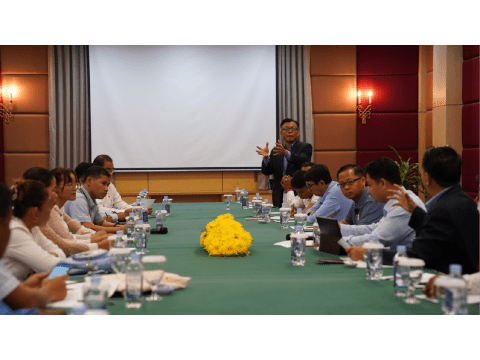Food System Consultation draws challenges and recommendations for the upcoming "Third National Strategy for Food Security and Nutrition"

On June 09, 2023, World Vision International in Cambodia (WVI-C) and Council for Agriculture and Rural Development (CARD) jointly organised a consultation workshop on "Towards Sustainable for Food Systems" to understand barriers and challenges in promoting sustainable food systems in Cambodia.
Despite substantial progress, persistent levels of acute malnutrition over the decades is a concern since it impacts young children's cognitive and physical development. The Second National Strategy for Food Security and Nutrition has the targets set to reduce stunting among children from 32% (2014) to 25% (2023); this target has been achieved based on the evidence from Cambodia Demographic and Health Survey (CDHS) 2021-2022, at 22%. Data from CDHS also showed that acute malnutrition is almost unchanged when compared between 2014 (10%) and 2021 (9.9%), and the targets set at 8% were not achieved.
In the opening remarks, H.E Sok Silo, Secretary General of the Council for Agriculture and Rural Development (CARD), said that the food system and nutrition are interlinked and face shocks due to rapidly changing food environments. H.E. Silo added that to eliminate all forms of malnutrition, the Royal Government of Cambodia has developed and disseminated regulations and necessary measures, which include Fast Track Roadmap to Improve Nutrition, and CARD has also launched the Second National Strategy on Food Security and Nutrition 2019-2023, Cambodia's Roadmap for Food Systems for Sustainable Development 2030, as well as the sectoral action plan and strategies, aiming at "ending hunger, achieving food security, improving nutrition and promoting sustainable agriculture" for increasing productivity and boosting economic growth. He mentioned that “there is a need to improve the collaboration between the stakeholders, especially at the national and sub-national, private sector, Civil Society Organisations, and development partners to implement the policy and strategy. We already have the policy, regulation and framework but need cooperation to implement them effectively.”
Mr Andreas Zurbrugg, Deputy Ambassador at the Australian Embassy in Cambodia, said World Vision had been a significant development partner for Cambodia for more than 50 years. Andreas emphasised that “Over this period, we have provided over AUD 67 million to support their programs. This includes the Micro-Franchised Agricultural Service Expanded Phase – 2 (MASE 2) project, which focused on improving the livelihoods of Agriculture-Cooperatives (AC), enhancing agricultural techniques, and establishing market linkages. It is good to see the results of this project continue to be sustainable, even after the project closure, and contribute to improved nutrition and food systems.”
Janes Imanuel Ginting, Country Director of World Vision in Cambodia, mentioned that WVI-C has been implementing a wide range of agriculture, farm-based approaches, and skill development programs at the community level to improve food systems and households’ income-earning capacity. He also highlighted the importance of youth and women empowerment, including them in policy dialogue and decision-making, providing exclusive support to small and medium entrepreneurs (SMEs), and promoting vocational skill-building programmes. “However, at the national and sub-national level, challenges and barriers persist, which limit us from achieving sustainable food systems in the country. Identifying them and making an effort to overcome them would be game changers at the national level,” Janes added.
Janes concluded, "As a part of this event, WVI-C and CARD have moderated group discussions to explore the challenges, recommendations, and solutions which will be potentially incorporated into the upcoming 'Third National Strategy for Food Security and Nutrition."
This event had the representation of 55 staff from national and international NGOs, civil societies, and institutions, 17 from private sectors, 15 Government officials, and 19 Agriculture Co-operative members.